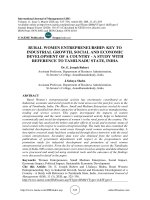Economic growth and economic development 577
Bạn đang xem bản rút gọn của tài liệu. Xem và tải ngay bản đầy đủ của tài liệu tại đây (126.3 KB, 1 trang )
Introduction to Modern Economic Growth
(3) consumers and firms have access to a “stock market,” where each consumer
can hold a balanced portfolio of various research firms.
In many of the models we study in the next two chapters, firms will face uncertainty (for example, regarding whether their R&D will be successful or how long
their monopoly position will last), but the three conditions outlined here will be satisfied. When this is the case, even though each firm’s revenue is risky, the balanced
portfolio held by the representative the consumer will have deterministic returns.
Here we illustrate this with a simple example.
Example 12.2. Suppose that the representative household has a utility function
over consumption given by u (c), where u (·) is strictly increasing, continuously differentiable and strictly concave, so that individual is risk averse. Moreover, let us
assume that limc→0 u0 (c) = ∞, so that the marginal utility of consumption at zero
is very high. The individual starts with an endowment equal to y > 0. This endowment can be consumed or it can be invested in a risky R&D project. Imagine
that the R&D project is successful with probability p and will have a return equal
to 1 + R > 1/p per unit of investment. It is unsuccessful with probability 1 − p,
in which case it will have a zero return. When this is the only project available,
the individual would be facing consumption risk when it invests in this project. In
particular, the maximization problem that determines how much he should invest
will be a solution to the following expected utility maximization
max (1 − p) u (y − x) + pu (y + Rx) .
x
The first-order condition of this problem implies that the optimal amount of investment in the risky research activity will be given by:
u0 (y − x)
pR
=
.
u0 (y + Rx)
1−p
The assumption limc→0 u0 (c) = ∞ implies that x < y, thus less than the full endow-
ment of the individual will be invested in the research activity, even though this is a
positive expected return project. Intuitively, the individual requires a risk premium
to bear the consumption risk associated with the risky investment.
Next imagine a situation in which many different firms can independently invest
in similar risky research ventures. Suppose that the success or failure of each project
563









